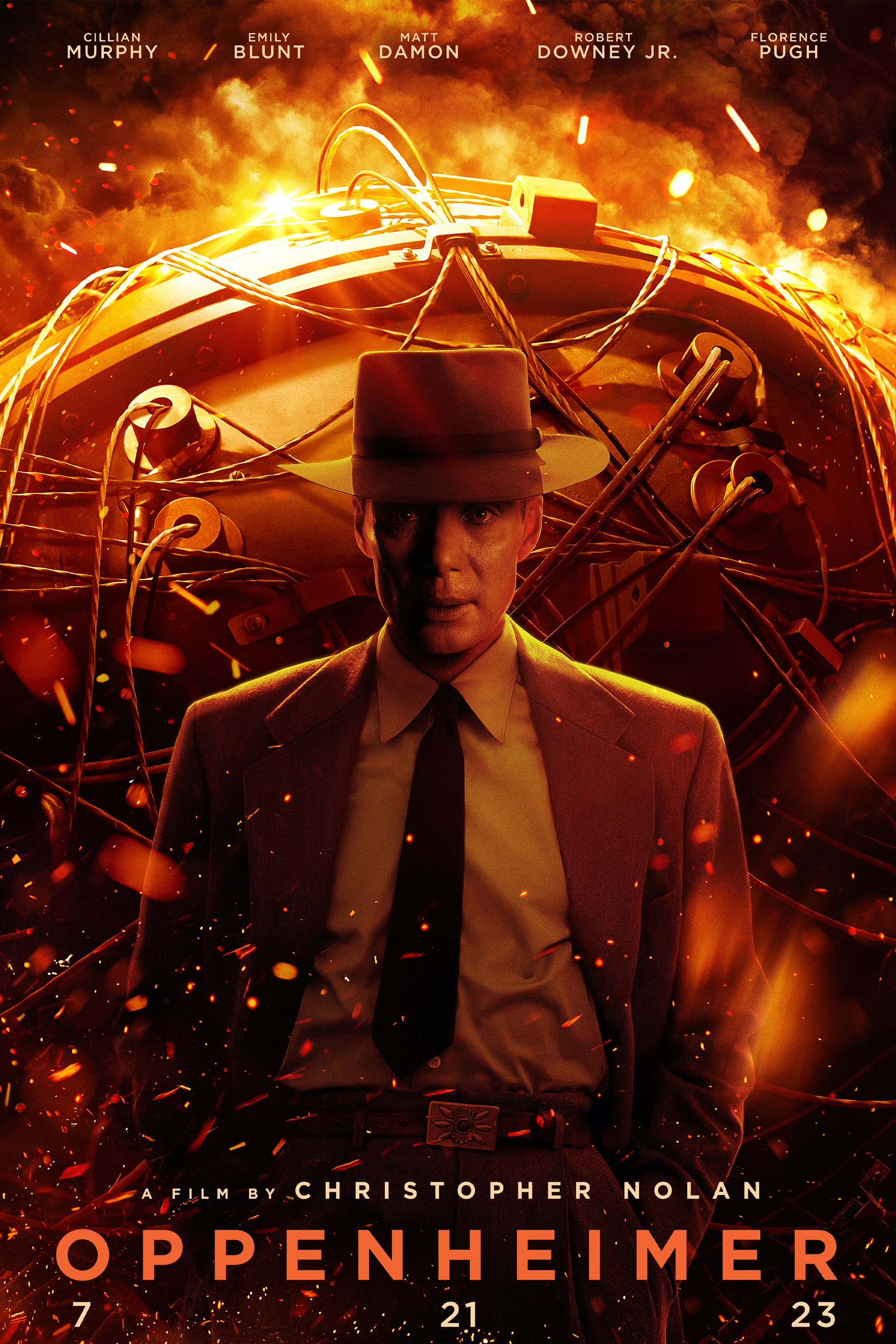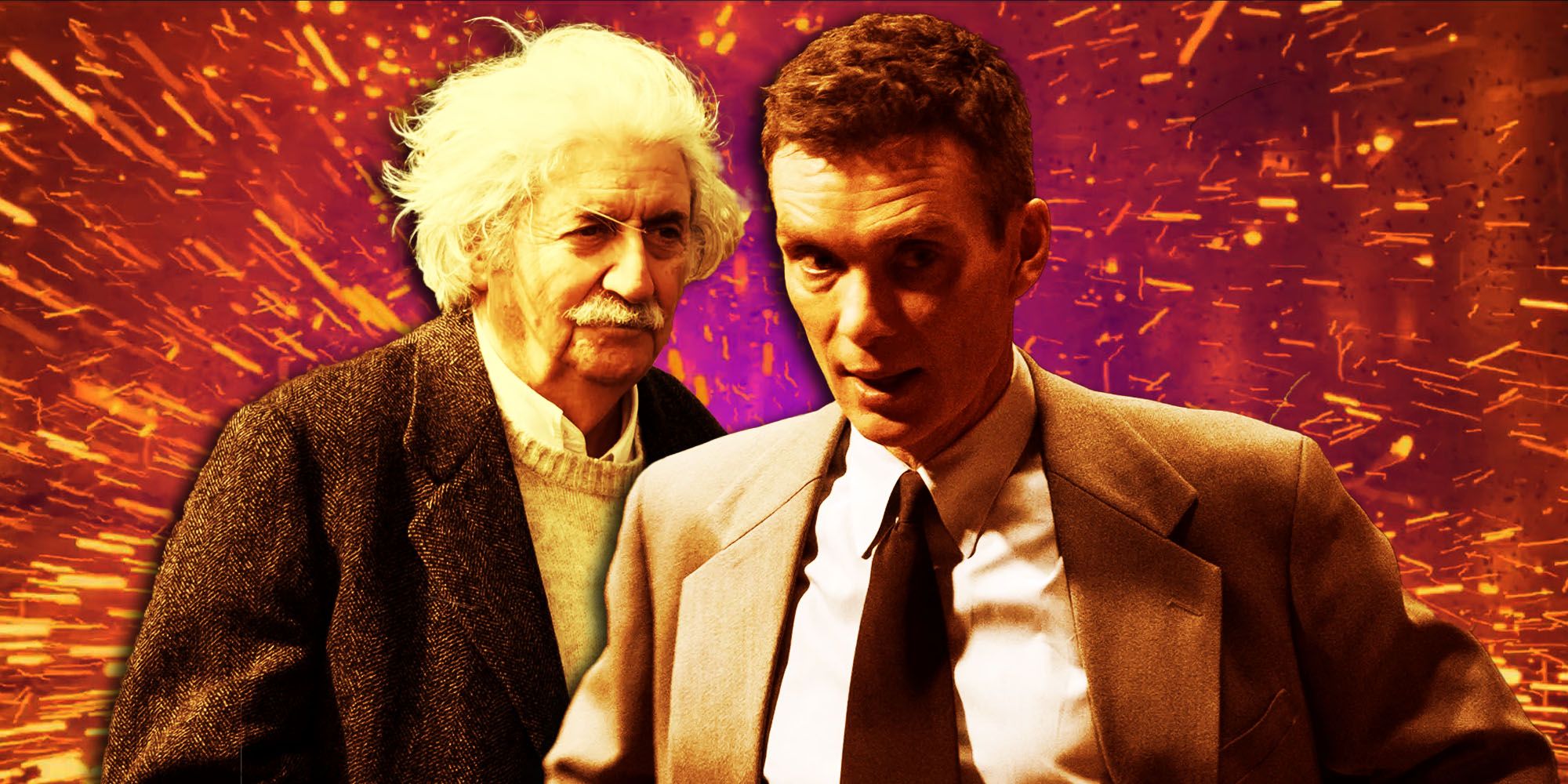The conversation between J. Robert Oppenheimer and Albert Einstein in Christopher Nolan's film is, very much, a scene that many people remember. It's a quiet moment, yet it holds a tremendous weight, acting as a bookend to the entire story. This particular exchange, set by a tranquil pond, gives us a window into the minds of two scientific giants, touching on their personal fears and the immense consequences of their work. People are often left wondering just what was said, and why it matters so much to the narrative.
For those who watched the movie, or perhaps felt a little confused by the film's intricate plot, this specific interaction with Einstein, played by Tom Conti, and Oppenheimer, portrayed by Cillian Murphy, stands out. It's a scene that not only reveals a deep connection between these two men but also weaves together their lives, showing the profound repercussions of their scientific pursuits. It's a moment that, you know, really sticks with you.
So, what exactly did Oppenheimer tell Einstein in that final, reflective scene? We'll look closely at the dialogue from the film, drawing directly from the provided text to explain the fears Oppenheimer expressed and the heavy meaning behind his words. This discussion truly helps explain the movie's ending and the lingering feelings of guilt and responsibility Oppenheimer carried.
Table of Contents
- Robert Oppenheimer: A Brief Look at the Man
- The Setting of the Conversation: A Place of Reflection
- Oppenheimer's Deep-Seated Fears: A Chain Reaction of Destruction
- The Earlier Conversation: A Memory Recalled
- Einstein's Response: A Knowing Nod
- The Haunting Line: "I Believe We Did"
- The Weight of Responsibility and Guilt
- Frequently Asked Questions About the Oppenheimer-Einstein Exchange
Robert Oppenheimer: A Brief Look at the Man
Before diving into the specifics of their conversation, it's helpful to remember a little about J. Robert Oppenheimer himself. He was, after all, the brilliant physicist who led the Los Alamos Laboratory during the Manhattan Project, becoming known as the "father of the atomic bomb." His work changed the world forever, and his story is one of immense scientific achievement paired with profound moral questions.
His life was marked by incredible intellect, a complex personality, and, later, a deep sense of burden for the weapon he helped create. The movie does a good job of showing these layers, and his interaction with Einstein is a key part of that portrayal. So, you know, understanding his background helps make sense of his words.
Personal Details and Bio Data of J. Robert Oppenheimer
| Full Name | Julius Robert Oppenheimer |
| Born | April 22, 1904 |
| Died | February 18, 1967 (age 62) |
| Nationality | American |
| Known For | Theoretical physicist, "father of the atomic bomb" |
| Key Role | Director of the Los Alamos Laboratory during the Manhattan Project |
| Education | Harvard University, University of Cambridge, University of Göttingen |
The Setting of the Conversation: A Place of Reflection
The final scene in Christopher Nolan's film, where Oppenheimer speaks with Einstein, is a flashback to one of the movie's very first moments. This conversation happens by a quiet pond, a rather serene setting that contrasts sharply with the world-altering topics they discuss. It's a place where two great minds can, in a way, truly connect and share their deepest thoughts without interruption.
This specific location, too, seems to underscore the reflective nature of their talk. It's a moment of looking back, of grappling with decisions made and their far-reaching effects. Oppenheimer and Albert Einstein, played by Cillian Murphy and Tom Conti, respectively, have this exchange that feels both personal and incredibly significant to the larger story.
Oppenheimer's Deep-Seated Fears: A Chain Reaction of Destruction
So, what did Oppenheimer actually tell Einstein? The core of his message revolves around a profound fear he held about the atomic bomb's creation. Oppenheimer, in this conversation, tells Einstein that he fears the very act of building the bomb will start a dangerous chain reaction. This reaction isn't about physics; it's about nations.
He expresses a concern that other nations would try to outdo the atomic bomb, leading to an endless cycle of creating even more powerful weapons. This idea of an arms race, where countries constantly try to surpass each other in destructive capability, was very much on his mind. It's a confession of his fear that the development of nuclear weapons would set off this competitive race.
His worry was that the world would enter a period where every country would rush to build their own bombs, escalating global tensions without end. This specific fear, it's quite clear, shows Oppenheimer's growing sense of guilt and his understanding of the immense responsibility that came with developing such a weapon. He had, after all, been motivated by a desire to use the bomb for a specific purpose, but the aftermath was something he greatly feared.
The Earlier Conversation: A Memory Recalled
During their discussion, Oppenheimer also asks Einstein to remember a conversation they had in the past. This earlier talk, which we saw discussed earlier in the movie, involved complex calculations. It was a time when they worried about an unintentional chain reaction from the Trinity test, the first detonation of an atomic bomb, possibly destroying the entire world.
This reference brings a powerful sense of circularity to the film. Oppenheimer reminds Einstein that while the bomb was still being built, they had these specific worries. It connects the beginning of the project, filled with theoretical fears, to the aftermath, where new, equally terrifying fears emerge. This callback truly highlights the enduring weight of their scientific endeavors.
The final scene, in a way, is a flashback to one of the film's first scenes, showing this conversation between Oppenheimer and Albert Einstein. It's a clever narrative device that brings the story full circle, emphasizing the long-lasting impact of their initial calculations and concerns.
Einstein's Response: A Knowing Nod
Einstein's reaction to Oppenheimer's confession is, in some respects, quite telling. He sardonically calls the younger scientist "the man of the moment" for successfully creating the first atomic bomb. Then, he reminds Oppenheimer of their earlier conversation, the one about the calculations and the potential for global destruction.
Einstein's response suggests a deep, almost weary understanding. It's as if he's saying, "Yes, I've been there; this is the way it is for men like us." He seems to acknowledge the burden that comes with groundbreaking scientific discovery, particularly when it has such destructive potential. His words imply a shared experience of profound responsibility and the difficult reality of their contributions.
The exchange truly reflects Oppenheimer's increasing guilt and his sense of accountability for developing the atomic bomb. Einstein's reaction validates these feelings, showing a kind of solidarity in the face of such immense moral weight. You know, it's a very subtle but powerful moment.
The Haunting Line: "I Believe We Did"
The most impactful part of their final exchange comes when Oppenheimer delivers a chilling line. The movie ends with Oppenheimer telling Einstein that there was a time when the Manhattan Project would possibly destroy the world. Einstein, perplexed, asks him what about that incident, to which Oppenheimer replies, "I believe we did."
This statement is a stark, quiet acceptance of a terrible truth. Oppenheimer is, in essence, acknowledging that they had, in fact, led the world to its destruction, not through a literal explosion of the planet, but by initiating a new, dangerous era. He says he believes they did start a chain reaction, a chain of events that could lead to the world's undoing.
This line, "I believe we did," is a powerful expression of Oppenheimer's overwhelming guilt and his realization of the true cost of their scientific success. It encapsulates the profound moral dilemma at the heart of the film and Oppenheimer's own personal struggle. It's a very, very somber moment that lingers long after the credits roll.
The Weight of Responsibility and Guilt
The entire conversation with Einstein serves as a powerful reflection of Oppenheimer’s growing guilt and his sense of responsibility for developing the atomic bomb. He had initially been driven by a desire to use the bomb to end a war, but the consequences, the potential for endless conflict and global destruction, weighed heavily on him.
This exchange highlights the shift in Oppenheimer's perspective from a scientist focused on a mission to a man grappling with the moral fallout of his creations. It's a poignant moment that shows the human cost of scientific progress when it unleashes forces beyond immediate control. The intimate friendship between Oppenheimer and Einstein, too, makes this conversation even more impactful, as it's a shared burden.
To learn more about the historical context of the Manhattan Project on our site, you can explore our detailed articles. Also, you might want to link to this page to find out more about our mission. These discussions, you know, are incredibly important for understanding the broader implications. For more historical context, you might find information on the Manhattan Project at History.com quite useful.
Frequently Asked Questions About the Oppenheimer-Einstein Exchange
What was the main fear Oppenheimer expressed to Einstein in the movie?
Oppenheimer confessed to Einstein his fear that creating the atomic bomb would set off a dangerous chain reaction. He worried that other nations would rush to build their own bombs, attempting to outdo the atomic weapon, leading to an endless arms race and, very possibly, global destruction.
Did Einstein understand Oppenheimer's concerns?
Yes, Einstein's response suggested a deep understanding and a shared sense of burden. He sardonically called Oppenheimer "the man of the moment" and reminded him of their earlier worries about an unintentional chain reaction. His demeanor implied, "I've been there; this is how it is for people like us."
What did Oppenheimer mean by "I believe we did"?
When Oppenheimer says, "I believe we did," he's acknowledging that they had, in a sense, brought about the world's destruction. This wasn't a literal explosion of the planet, but rather the initiation of a new, perilous era of nuclear proliferation and constant threat, a chain reaction of political and military escalation.



Detail Author:
- Name : Gracie Wisozk
- Username : casimir.lueilwitz
- Email : nblick@yahoo.com
- Birthdate : 1985-09-22
- Address : 6315 Nienow Points Mikelfort, MN 13633
- Phone : 234-433-6832
- Company : Wiza, Ernser and Dickinson
- Job : Tire Changer
- Bio : Animi dolorum est porro occaecati et. Dolor at natus commodi sit recusandae minus. Repellat eligendi ut mollitia tempore voluptatem ab.
Socials
instagram:
- url : https://instagram.com/kian9242
- username : kian9242
- bio : Magnam voluptates voluptas velit. Earum sed iusto alias autem.
- followers : 2364
- following : 289
facebook:
- url : https://facebook.com/kian_kuvalis
- username : kian_kuvalis
- bio : Exercitationem ut dolore nihil quo voluptatum non officiis quos.
- followers : 6682
- following : 1156
twitter:
- url : https://twitter.com/kuvalisk
- username : kuvalisk
- bio : Ratione maiores voluptas assumenda est sapiente. Quia aliquid reprehenderit et aut. Possimus accusantium cum culpa possimus dolores vel debitis.
- followers : 529
- following : 384